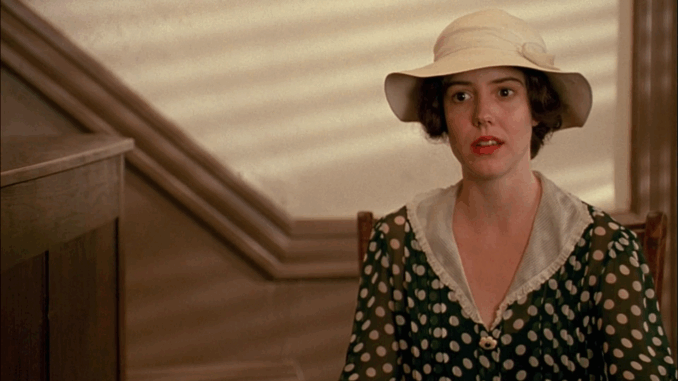
A Letter That Changes Everything
Sometimes the boldest acts are the quietest.
In Fried Green Tomatoes, Ruth Jamison’s decision to return to Whistle Stop, Alabama, is framed not by fanfare or confrontation but by a simple handwritten letter. Addressed to Idgie Threadgoode and sent during Ruth’s darkest days of abuse and isolation, the letter is spare but urgent. Its language is modest, filled with coded emotion. But its message is unmistakable: come and get me.
In a time when women had few legal protections and even fewer avenues of escape, Ruth’s act of writing that letter is as radical as any revolution. She reaches across time and pain to the one person she knows will understand—and act.
Idgie’s Unquestioning Response
When Idgie receives Ruth’s letter, she doesn’t hesitate. There is no discussion, no pause to weigh the consequences. She immediately sets out for Valdosta, Georgia, accompanied by Sipsey and Big George. The act is quiet but thunderous in its defiance: a woman rescuing another woman, outside of institutions, beyond the rules of law, church, or society.
The film doesn’t dramatize the scene with violence or sensationalism. Instead, it honors its emotional weight. Idgie enters Ruth’s oppressive home, confronts her brutish husband Frank Bennett with nothing but her stare, and walks out with Ruth. No dramatic shootout, no melodrama—just an act of love rooted in loyalty.
It’s the simplicity that makes it revolutionary.
Ruth’s Decision: Strength in Vulnerability

Ruth’s decision to leave Frank is not one of rash impulse. It comes after years of enduring emotional and physical abuse. As a devout Christian and Southern woman, she has likely been told all her life that it is her duty to obey her husband, to endure suffering silently. But something inside her shifts.
That shift is not fueled by rage—it is fueled by love. Not romantic love alone, but love of self, love of her child, and love of the life she believes she might reclaim.
Ruth’s moment of clarity is one many women never reach. And when she steps out of Frank’s house, she is no longer his possession. She is no longer a character in someone else’s story. She becomes her own author.
Returning to Whistle Stop: A Second Chance at Life
When Ruth returns to Whistle Stop, the camera frames the town as both familiar and transformed. It’s as though she is seeing it not through the lens of nostalgia, but with the cautious hope of someone being reborn.
She is welcomed not with pity but with purpose. She and Idgie immediately set about transforming their grief and uncertainty into action—they open the Whistle Stop Café. This isn’t just a restaurant. It’s a metaphor for rebirth. For reclamation. For creating a space in the world that defies judgment.
The act of returning is more than physical. It is spiritual. Ruth is not running away from her past—she is walking toward her future.
A Life Lived on Their Own Terms
In the conservative South of the 1920s and ’30s, two unmarried women living together and running a business was already unusual. Add to that the deep emotional connection between Ruth and Idgie, and the relationship becomes quietly subversive. While the film never explicitly labels them as romantic partners, the love they share is deep, complex, and unmistakable.
The café becomes their sanctuary. It feeds not only their community but also their souls. In this space, Ruth laughs again. She reads to her child, shares jokes with Sipsey, and learns to live without fear. Her trauma doesn’t vanish, but it no longer defines her.
The life she builds in Whistle Stop is not glamorous, but it is rich in meaning. It is the life she chose—something too many women in her time never had the chance to do.
Symbolism of the Return
Ruth’s return to Whistle Stop is rich in symbolic layers. It represents a return to safety, but also to selfhood. In mythology, the return is often the final step of a hero’s journey—coming back from the underworld changed, wiser, more powerful. Ruth’s journey is no different.
She has faced violence, emotional starvation, and the limits of her society’s expectations for women. And yet she walks back into Whistle Stop not as a victim but as a survivor.
Even the town itself seems to understand. Whistle Stop embraces Ruth not as a fallen woman, but as one of its own. This welcome is not just a narrative convenience—it’s a statement. A vision of community built not on propriety, but on compassion.
Evelyn’s Mirror: The Echo in the Present Day
In the film’s modern timeline, Evelyn Couch hears Ruth’s story secondhand from Ninny Threadgoode. And yet she feels its impact as if it were her own. Ruth’s decision to leave Frank gives Evelyn the courage to question her own stagnant marriage. Her own feelings of invisibility and oppression.
This is the true magic of Ruth’s return: it is not just an event in her own life, but a torch passed across generations. A map for others to follow.
By leaving an abuser, by returning home, by reclaiming joy, Ruth plants a seed that blooms in women like Evelyn—women who need to be reminded that it is not too late to become who you were meant to be.
Conclusion: The Quiet Heroism of Coming Back
Ruth Jamison’s return to Whistle Stop may not seem dramatic at first glance. There are no fireworks, no heroic monologues. But within that quiet decision lies one of the film’s most profound moments of strength.
It is a reminder that reclaiming your life does not require permission. That home is not just where you come from, but where you are safe. That love—real, abiding, protective love—can carry you out of darkness and into the light.
Ruth’s story is one of many in Fried Green Tomatoes, but it is among the most deeply human. She doesn’t escape in the night. She walks through the front door.
And in doing so, she reclaims her story.
